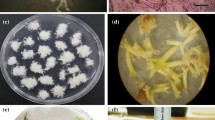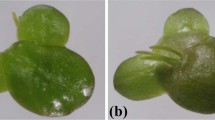Abstract
WE have already reported1 the growth responses of globular and complete embryos of Dendrophthoe falcata (L.f.) Ettings. These investigations have now been extended to Amyema pendula2 (Sieb. and Spreng.) van Tiegh., Amylotheca dictyophleba2 van Tiegh., and Scurrula philippensis2 (Cham, and Schlecht.) G. Don.—all members of the Loranthaceae.
This is a preview of subscription content, access via your institution
Access options
Subscribe to this journal
Receive 51 print issues and online access
$199.00 per year
only $3.90 per issue
Buy this article
- Purchase on Springer Link
- Instant access to full article PDF
Prices may be subject to local taxes which are calculated during checkout
Similar content being viewed by others
References
Johri, B. M., and Bajaj, Y. P. Singh, in Plant Tissue and Organ Culture—A Symposium, edit. by Maheshwari, P., and Ranga Swamy, N. S. (Intern. Soc. Plant Morphol., Delhi, 1963).
The fresh fruits of Amyema were kindly supplied by Dr. C. N. Williams, Division of Plant Industry, C.S.I.R.O., Canberra; of Amylotheca by Dr. B. A. Barlow, University of Queensland, St. Lucia, Brisbane; and of Scurrula by Dr. R. S. Rao, Botanical Survey of India, Poona.
For constituents of the medium, see Ranga Swamy, N. S., Phytomorphol., 11, 109 (1961).
Author information
Authors and Affiliations
Rights and permissions
About this article
Cite this article
JOHRI, B., BAJAJ, Y. Growth of Embryos of Amyema, Amylotheca, and Scurrula on synthetic Media. Nature 204, 1220–1221 (1964). https://doi.org/10.1038/2041220a0
Published:
Issue Date:
DOI: https://doi.org/10.1038/2041220a0
This article is cited by
-
Establishment of callus-cultures of the Argentinean mistletoe, Ligaria cuneifolia (R. et P.) Tiegh (Loranthaceae) and screening of their polyphenolic content
Plant Cell, Tissue and Organ Culture (PCTOC) (2019)
-
A protocol for in vitro germination and sustainable growth of two tropical mistletoes
Plant Cell, Tissue and Organ Culture (2005)
-
Tissue culture of parasitic flowering plants: Methods and applications in agriculture and forestry
In Vitro Cellular & Developmental Biology - Plant (1999)
-
Embryo rescue in plants—a review
Euphytica (1996)
Comments
By submitting a comment you agree to abide by our Terms and Community Guidelines. If you find something abusive or that does not comply with our terms or guidelines please flag it as inappropriate.



